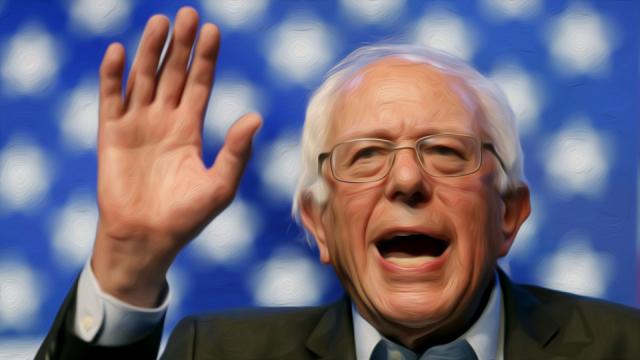
In an interview with Fusion’s Felix Salmon the day after last week’s Democratic debate and published Tuesday, Senator Bernie Sanders discussed the marquee features of democratic socialism he’s been tirelessly calling for during his presidential campaign: higher taxes for the wealthiest Americans, an increased minimum wage, and breaking up the biggest Wall Street banks.
Salmon also raised a possibility that has not been as prominent in Sanders’s stump speeches, but animates him nonetheless: turning the U.S.’s post offices into banks. Sanders:
"If you are a low-income person, it is, depending upon where you live, very difficult to find normal banking. Banks don’t want you. And what people are forced to do is go to payday lenders who charge outrageously high interest rates. You go to check-cashing places, which rip you off. And, yes, I think that the postal service, in fact, can play an important role in providing modest types of banking service to folks who need it."
It’s something Sanders alluded to in a 2014 Wall Street Journal op-ed, and it’s not even the craziest idea proposed to save the USPS – a report last year explored the implications of turning post offices into hubs for 3-D printing.
In fact, Sanders’s idea is quite sensible. “Postal banking” – which just means that post offices run savings accounts, cash checks, and perform other basic financial services – is common in most of Asia and Europe, and only about 7 percent of the world’s national postal systems don’t offer some bank-like services. Postal banking is a really good way to reach people who haven’t had access to standard savings accounts. One estimate figures that more than 1 billion people have used post offices for making deposits.
The reason why this would be so useful in the U.S. is that somewhere between 20 and 40 percent of the population has to rely on check-cashing or payday-lending services, which in some places charge usurious rates that send people into spirals of recurring debt. Mehrsa Baradaran, a professor at the University of Georgia School of Law and the author of How the Other Half Banks, touched on the promise of postal banking in a book excerpt published in The Atlantic last week:
"The basic idea of modern postal banking is a public bank offering a wide range of transaction services, including financial transactions, remittance, savings accounts, and small lending. These institutions would remain affordable because of economies of scale and because of the existing postal infrastructure in the U.S. Plus, in the absence of shareholders, they would not be driven to seek profits and could sell services at cost."
In her essay, Baradaran made the point that the Federal Reserve helps struggling banks through temporary credit crunches—so why doesn’t the government treat struggling individuals the same way? It’s not unheard of in the U.S.; in 1910, William Howard Taft introduced a postal-savings system for new immigrants and the poor that lasted until 1967. Today, it’d be a huge relief for people without access to banks, with an added bonus: It’d give the U.S. a leg up on Denmark, the nation that both Sanders and Hillary Clinton professed love for in the debate and which doesn’t currently have postal accounts.
*
MEANWHILE, Mike Leyba reports in The Huffington Post that Bernie's "brilliant idea" for postal banking would resolve problems like the RushCard fiasco that has locked thousands out of their accounts this week:
At the Democratic debate, Bernie Sanders famously suggested that the only way to fix our country was with a political revolution. He suggested that in order to get our country back on track, millions of people would need to take to the streets and demand that the government return to its mission of helping people, not corporations. And by all these measures, one of his ideas would revolutionize the way people interact with our economy: postal banking.
The idea of using post offices to provide banking services is not a new one. In fact, from 1911 to 1967, post offices offered savings accounts. The idea was to get the "money out from under mattresses" and over time, encourage savings and wealth building. Many unbanked or underbanked people already frequent post offices, as the postal service offers money orders at a lower cost than nearly anywhere else.
In the United States, one in five households are underbanked, meaning that while they may have a checking account, they also rely on a network of predatory financial service providers (such as check cashers, payday lenders, auto title lenders, etc) to make ends meet. For Blacks, this number is closer to one in three households, and for Latinos, Native Americans, and Native Hawaiians/Pacific Islanders, one in four families are underbanked. Eager to profit off of this exclusion, alternate financial service providers rake in $103 billion per year in fees and interest at the expense of the most financially vulnerable. Postal banking could change this completely.
One type of predatory financial service that has been in the news lately is the RushCard, Russell Simmons' self described effort to "empower" black and low-income communities with prepaid debit cards. This week, thousands of users have been locked out of their accounts, told they have no account, or unable to access the wages that they worked for. On top of this, prepaid debit cards such as Rushcard often charge fees for inactivity, activation, adding money manually, or calling customer service, making it incredibly expensive to be poor.
This idea is not only possible, we have done it before. But more importantly, it puts people back in the center of our economy, not the big banks. Postal banking could revolutionize our relationship to our economy for millions of workers, and make our economy a more fair place for everyone.
3 WAYS TO SHOW YOUR SUPPORT
- Log in to post comments













